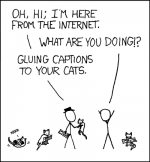LOLCats study mind-control at Yale
 A bit of vindication today.
A bit of vindication today.
It was two weeks ago that Trish saw a picture of a cat on my laptop and exclaimed “No more LOLCats!” She is so annoyed with the cats (or rather the frequency with which I will make a cultural reference to one) that even an analysis of the visual rhetoric involved won’t warm her up to the topic.
Well, apparently there is a reason, and Yale researchers have provided it: Evolution Explains Why Lolcats Control Your Mind
Perhaps that is why Rae Maor predicted (shouting “LOLCATS will not die”, I might add) that 2008 will not see the end of our anthropomorphized friends.
Ahh, now that is nice. So Trish, this one is for you. I R B lulzin thrus the O-8s.



 Last fall I had the opportunity to learn a distressingly large amount about LOLCats while writing do research on media comparisons. The resulting paper argued that the relationships between image and text in both LOLCats and silent films share striking similarities. Both captions and intertitles were introduced to augment and extend the possibilities of the visual content. Probably more important, the paper included plenty of pictures of really cute cats.
Last fall I had the opportunity to learn a distressingly large amount about LOLCats while writing do research on media comparisons. The resulting paper argued that the relationships between image and text in both LOLCats and silent films share striking similarities. Both captions and intertitles were introduced to augment and extend the possibilities of the visual content. Probably more important, the paper included plenty of pictures of really cute cats.

 While I tend to blog along the more social and theoretical sides of technology, I thought I would share a post that Phil Windley just threw up on his blog, featuring the
While I tend to blog along the more social and theoretical sides of technology, I thought I would share a post that Phil Windley just threw up on his blog, featuring the 

